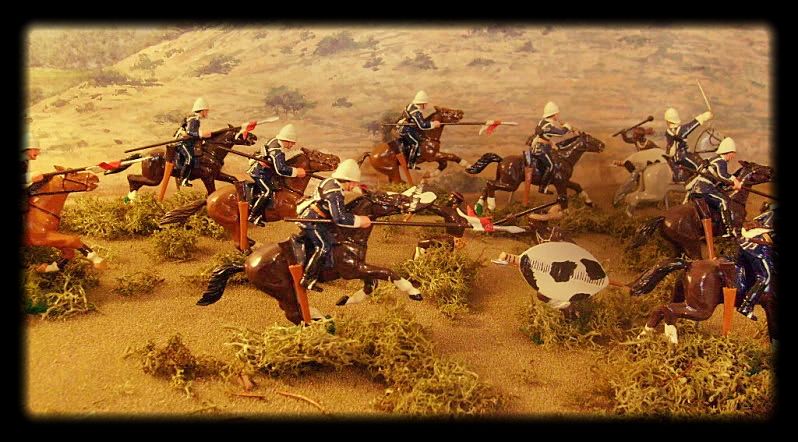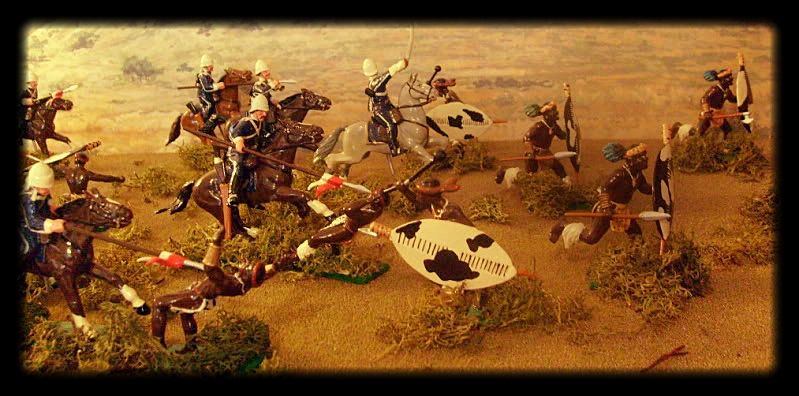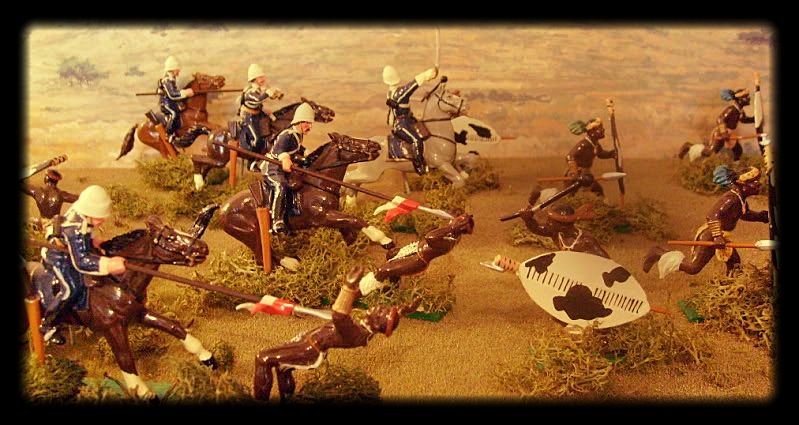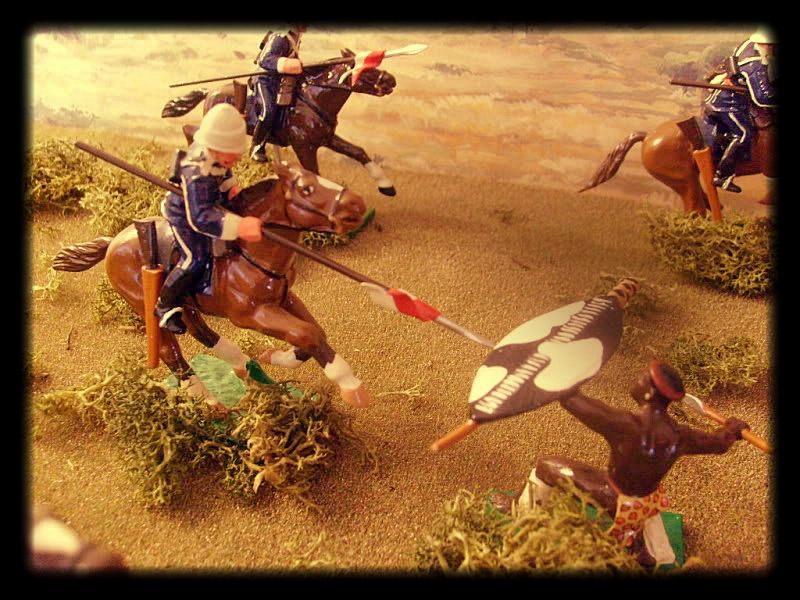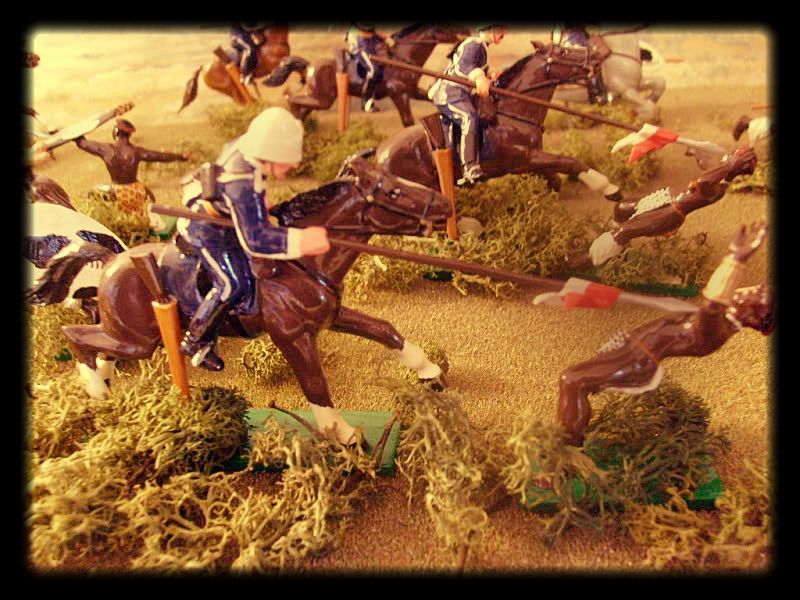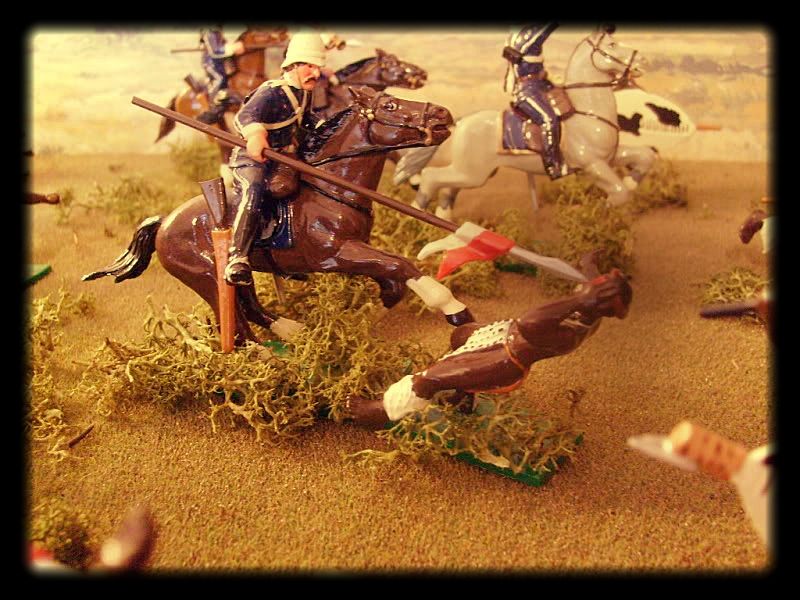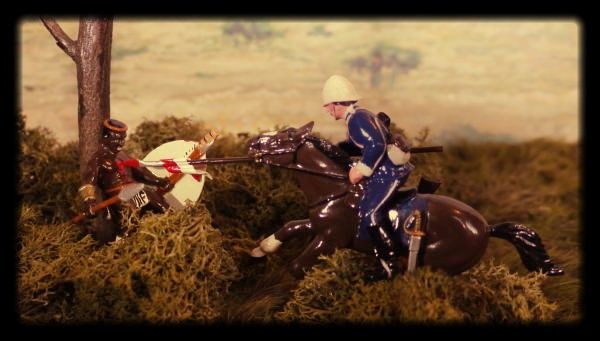And deservedly so. :wink2: -- Al80th Anniversary
May 23rd 1934 – The American bank robbers Bonnie and Clyde are ambushed by police and killed in Black Lake, Louisiana
http://en.wikipedia.org/wiki/Bonnie_and_Clyde
You are using an out of date browser. It may not display this or other websites correctly.
You should upgrade or use an alternative browser.
You should upgrade or use an alternative browser.
This day in History (1 Viewer)
- Thread starter Rob
- Start date
GICOP
Four Star General
- Joined
- Oct 16, 2008
- Messages
- 28,316
May 31st 1866 – In the Fenian Invasion of Canada, John O'Neill leads 850 Fenian raiders across the Niagara River at Buffalo, New York/Fort Erie, Ontario, as part of an effort to free Ireland from the United Kingdom. Canadian militia and British regulars repulse the invaders in over the next three days, at a cost of 9 dead and 38 wounded to the Fenian's 19 dead and about 17 wounded.
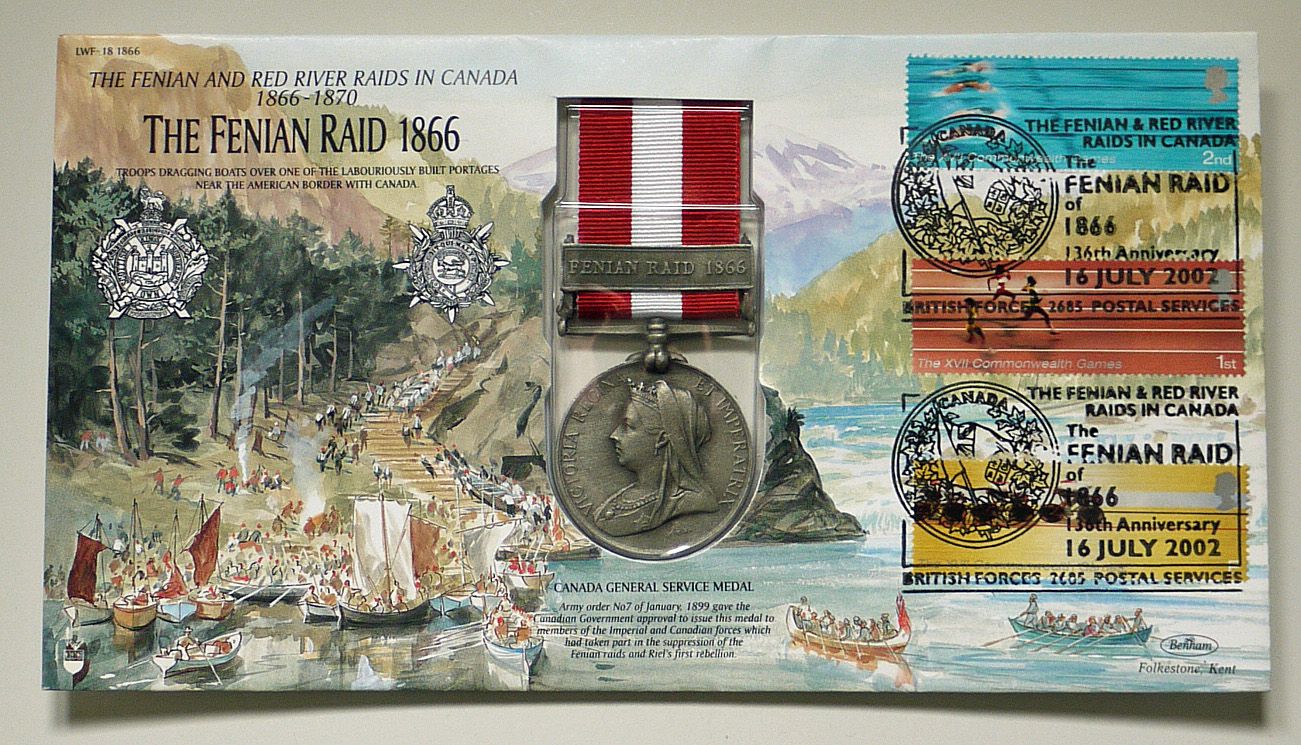
http://en.wikipedia.org/wiki/Fenian_raids

http://en.wikipedia.org/wiki/Fenian_raids
GICOP
Four Star General
- Joined
- Oct 16, 2008
- Messages
- 28,316
June 20th 1900 - Boxer Rebellion: The Imperial Chinese Army begins a 55-day siege of the Legation Quarter in Peking
http://en.wikipedia.org/wiki/Siege_of_the_International_Legations
Cheers
Martyn
http://en.wikipedia.org/wiki/Siege_of_the_International_Legations
Cheers
Martyn
GICOP
Four Star General
- Joined
- Oct 16, 2008
- Messages
- 28,316
June 26th 1857 – The first investiture of the Victoria Cross in Hyde Park, London
http://en.wikipedia.org/wiki/Victoria_Cross
http://en.wikipedia.org/wiki/Victoria_Cross
hotel3alpha
Command Sergeant Major
- Joined
- May 24, 2013
- Messages
- 2,055
GICOP,
Love the diorama! Really, really neat. Today in history...well in the US it is Independence Day from the vicious, horrible, insufferable, no taxation without representation, everybody must have tea time and a biscuit tyranny of the British Crown to become these United States. Couple a two hundred years later and we are still rolling pretty strong and now allow the brits to be on CNN. No hard feelings yo, all is well and now we are arm in arm singing kumbiaya...fought a few wars together and are now the two best buds on the block!
Amazing how times have changed and you wonder, where do we go from here?
Happy 4th!
John from Texas
Love the diorama! Really, really neat. Today in history...well in the US it is Independence Day from the vicious, horrible, insufferable, no taxation without representation, everybody must have tea time and a biscuit tyranny of the British Crown to become these United States. Couple a two hundred years later and we are still rolling pretty strong and now allow the brits to be on CNN. No hard feelings yo, all is well and now we are arm in arm singing kumbiaya...fought a few wars together and are now the two best buds on the block!
Amazing how times have changed and you wonder, where do we go from here?
Happy 4th!
John from Texas
GICOP
Four Star General
- Joined
- Oct 16, 2008
- Messages
- 28,316
September 2nd 1898 – The Battle of Omdurman
http://www.britishbattles.com/egypt-1882/battle-omdurman.htm
Colonel MacDonald and the 10th Sudanese Battalion

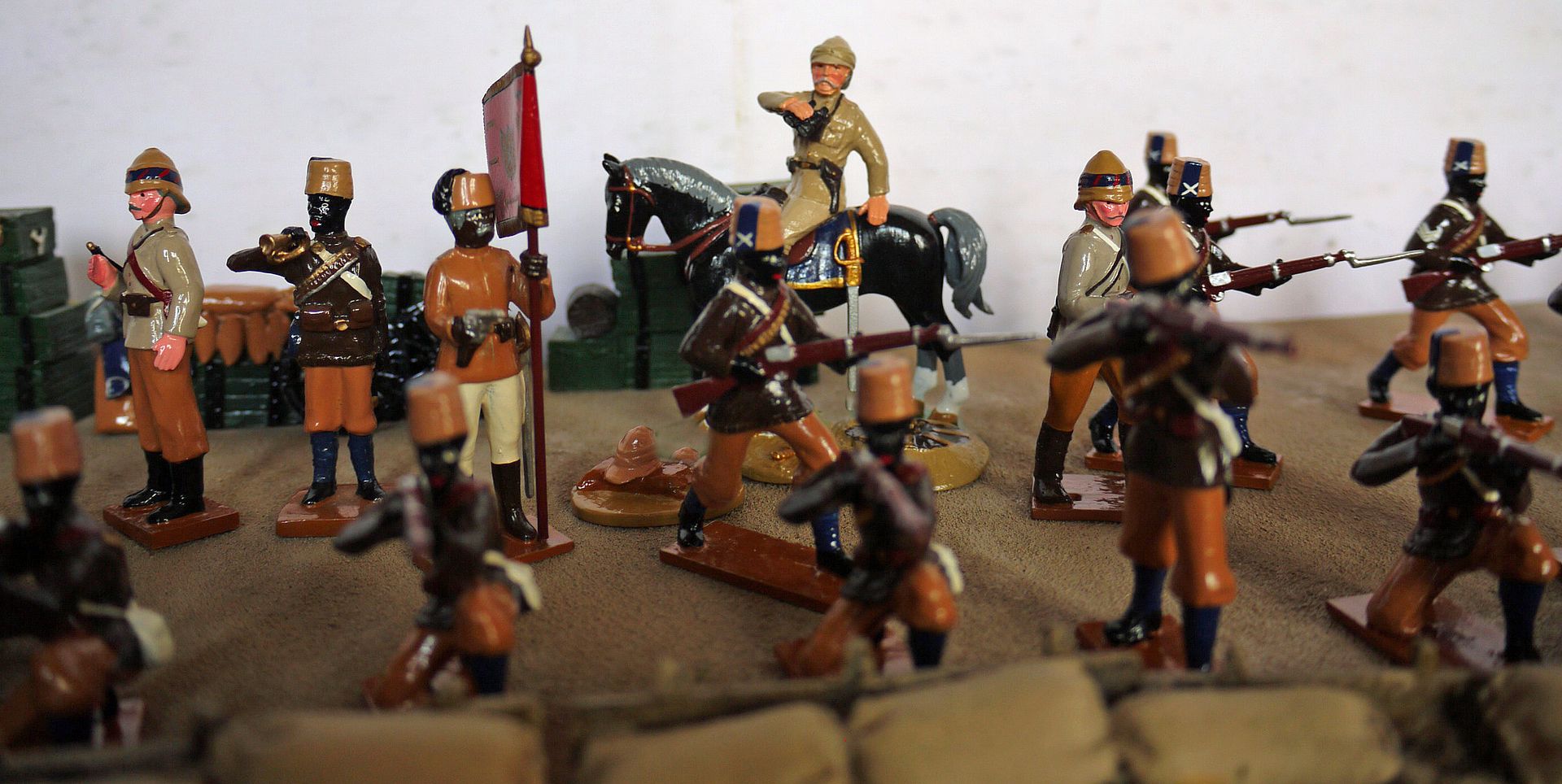
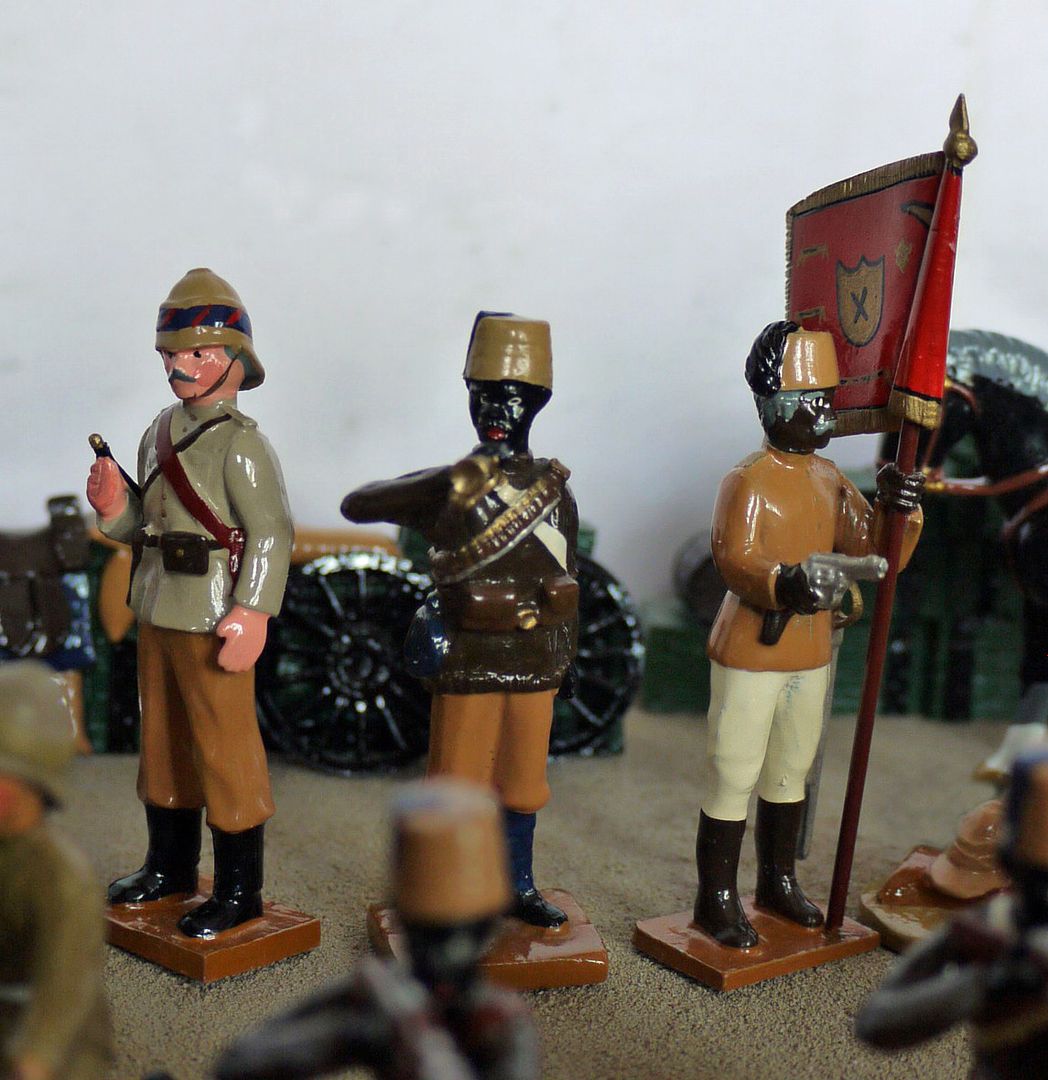




All figures - Trophy of Wales
Cheers
Martyn
http://www.britishbattles.com/egypt-1882/battle-omdurman.htm
Colonel MacDonald and the 10th Sudanese Battalion







All figures - Trophy of Wales
Cheers
Martyn
GICOP
Four Star General
- Joined
- Oct 16, 2008
- Messages
- 28,316
September 13th 1882 - The Battle of Tel el-Kebir, Egypt
http://www.britishbattles.com/egypt-1882/tel-el-kebir-1882.htm
Some of the British and Indian Regiments that took part
Gordon Highlanders
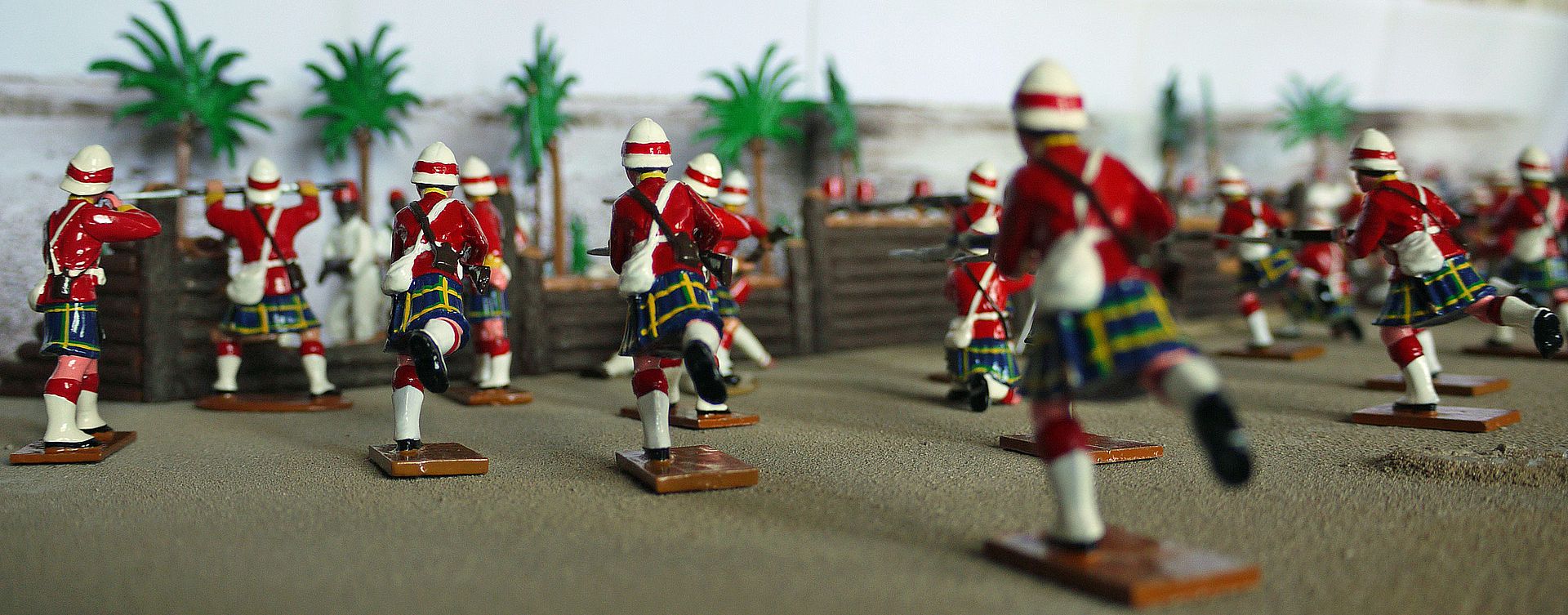
Black Watch
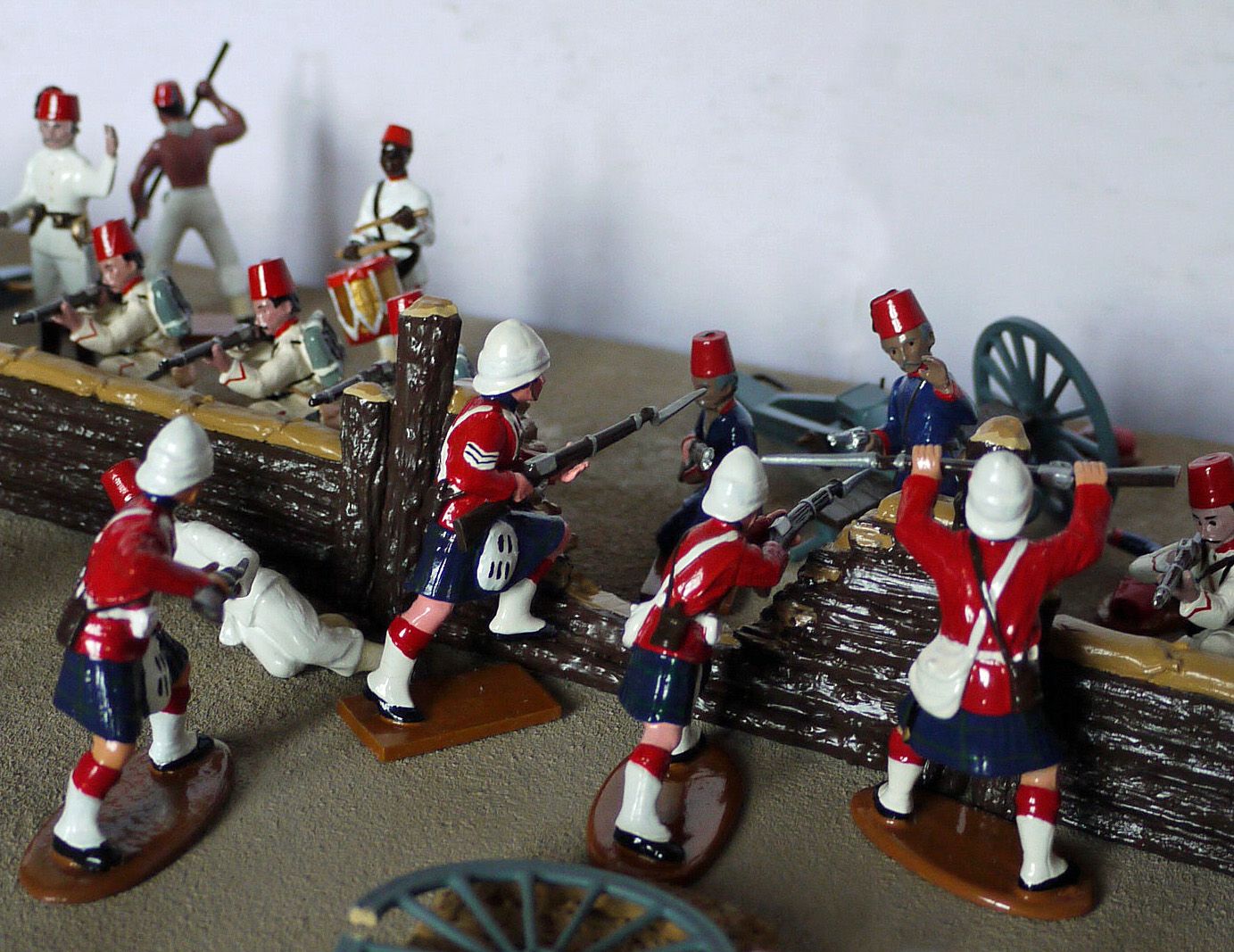
20th (PUNJAB) REGIMENT, BENGAL NATIVE INFANTRY
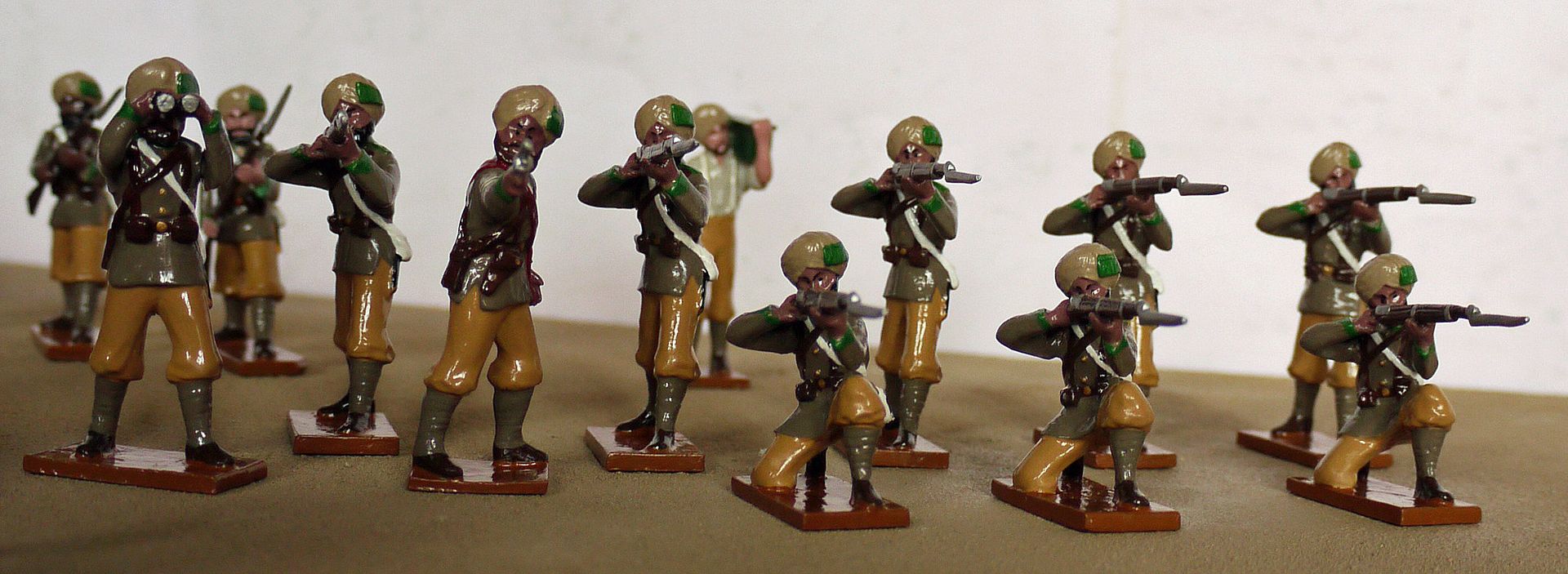
7th Bengal Native Infantry and 13th Bengal Lancers

Highland Light Infantry
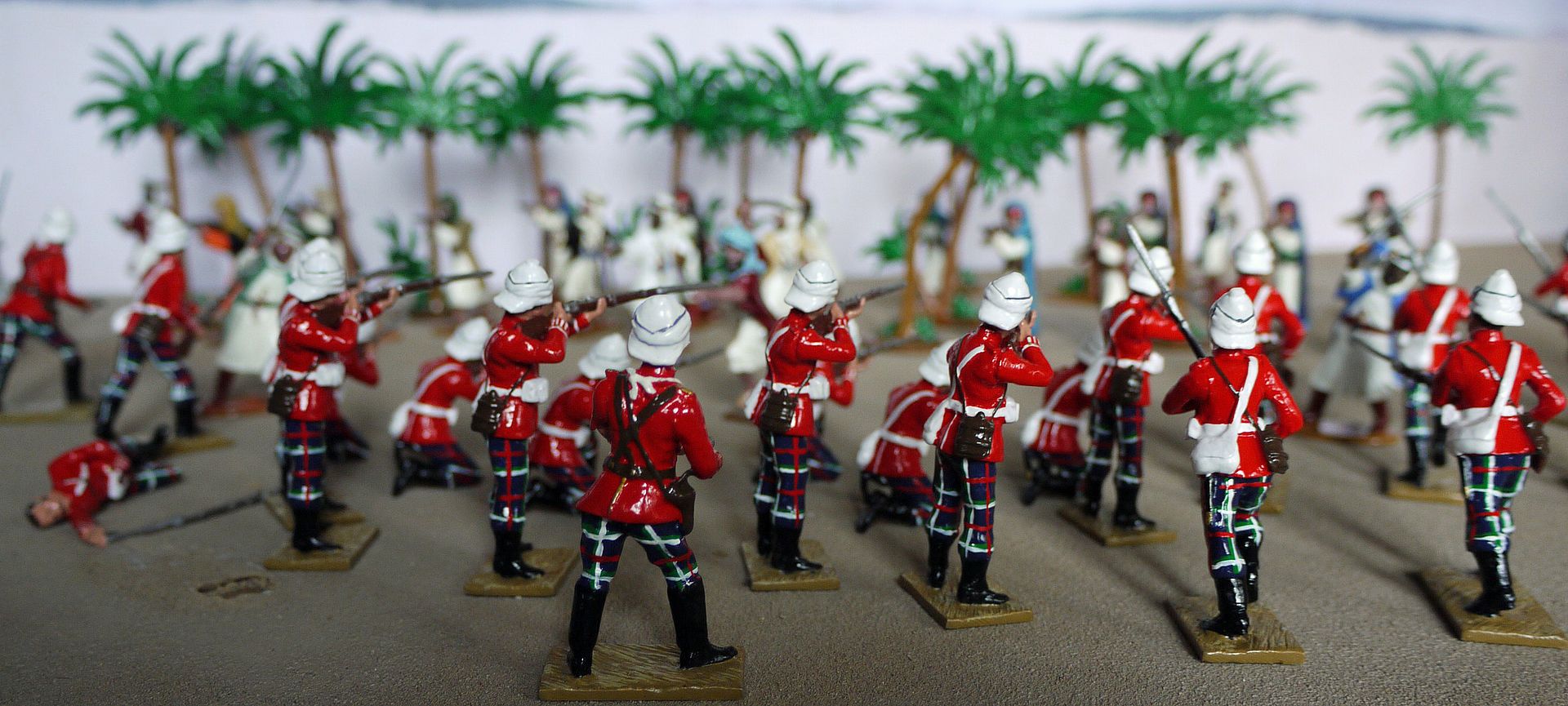
Cheers
Martyn
http://www.britishbattles.com/egypt-1882/tel-el-kebir-1882.htm
Some of the British and Indian Regiments that took part
Gordon Highlanders

Black Watch

20th (PUNJAB) REGIMENT, BENGAL NATIVE INFANTRY

7th Bengal Native Infantry and 13th Bengal Lancers

Highland Light Infantry

Cheers
Martyn
Obee
Major
- Joined
- Aug 27, 2009
- Messages
- 6,200
9th November 1914
Cocos Islands, Indian Ocean

Australia's first naval victory, a battle between HMAS Sydney and German raider SMS Emden
Six months before Gallipoli forged Australia's fighting reputation, the nation's new navy had its first victory at sea.
It was a bloody battle between the light cruiser HMAS Sydney and the notorious German raider, SMS Emden, just 3,000 kilometres off the mainland of Western Australia.
The win was strategically significant but would also become an important moment in a young nation's war history that lives on today through the descendants of those on board the ships.
More here : http://www.abc.net.au/news/2014-11-...ry-of-first-naval-victory/5853712?section=ww1
Lest we forget
John
Cocos Islands, Indian Ocean

Australia's first naval victory, a battle between HMAS Sydney and German raider SMS Emden
Six months before Gallipoli forged Australia's fighting reputation, the nation's new navy had its first victory at sea.
It was a bloody battle between the light cruiser HMAS Sydney and the notorious German raider, SMS Emden, just 3,000 kilometres off the mainland of Western Australia.
The win was strategically significant but would also become an important moment in a young nation's war history that lives on today through the descendants of those on board the ships.
More here : http://www.abc.net.au/news/2014-11-...ry-of-first-naval-victory/5853712?section=ww1
Lest we forget
John
GICOP
Four Star General
- Joined
- Oct 16, 2008
- Messages
- 28,316
December 4th 1893 -THE LAST STAND OF THE SHANGANI PATROL
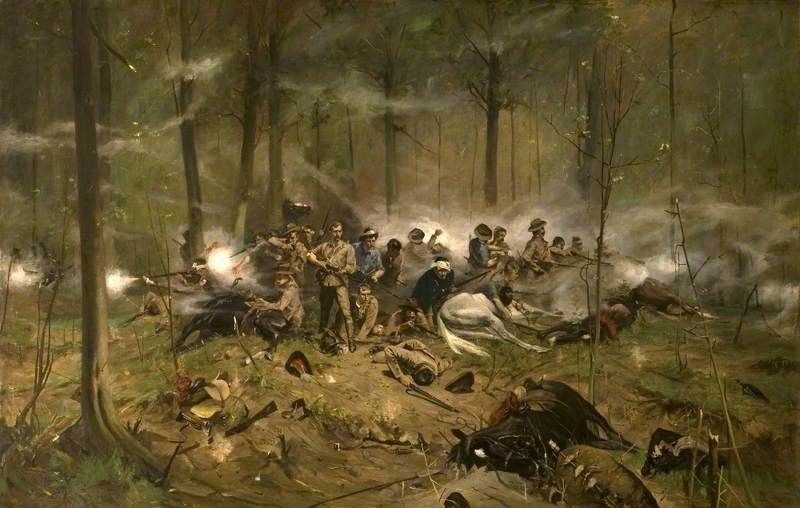
The Shangani Patrol, comprising 34 soldiers in the service of the British South Africa Company, was ambushed and annihilated by more than 3,000 Matabele warriors during the First Matabele War in 1893. Headed by Major Allan Wilson, the patrol, also referred to as Wilson's Patrol, was attacked just north of the Shangani River in Matabeleland in Rhodesia. Its dramatic last stand, sometimes called Wilson's Last Stand, achieved a prominent place in the British public imagination and, subsequently, in Rhodesian national history, roughly mirroring events such as the Alamo massacre or Custer's Last Stand in the United States.
The subsequent fate of the Wilson patrol, whose bones now rest beneath their memorial on the Matopo hill on which Cecil Rhodes lies buried, was gathered afterwards from Matabele sources. They had selected a clearing among the trees for their last stand and, some standing, some kneeling, poured a hot fire in all directions. The Matabele had the advantage of better cover and took time to aim accurately and make their shots tell. But so calmly and steadily did the patrol fight back that in spite of the bush and the trees they took a heavy toll of the enemy.
At one stage in the fight the Matabele said they had offered the white men their lives provided they laid down their arms and surrendered. Their offer was scornfully rejected. There would be no surrender.
An attempt to break through would mean sacrificing the wounded. That was unthinkable. They would face it together.
The patrol used their dead horses as cover, but their number steadily dwindled. Many were killed outright, and the wounded went on fighting until they lost consciousness. The fight went on until late in the afternoon. Just before the end the few surviving white men staggered to their feet, sang a few bars of "God Save the Queen", shook hands with each other, and waited for the end. It was not long in coming. The Matabele charged them with their assegais, and gave no quarter. One last man escaped for a few precious minutes, gained the top of an anthill a few yards away and shot down several Matabele before a bullet smashed his hip. He was still firing a revolver as the assegais ended his life.
There were no survivors
The men of the patrol came from all corners of the British Empire and beyond, most were born in Britain itself, over a dozen were English Public School and University men, Allan Wilson himself was originally Scottish, while Captain Henry Borrow was born in Cornwall. Also represented in the patrol were South Africa (several members, most prominently Captain William Judd), India (Troopers Dillon and Money), Canada (Scout Robert Bain), and New Zealand (Trooper Frank Vogel).
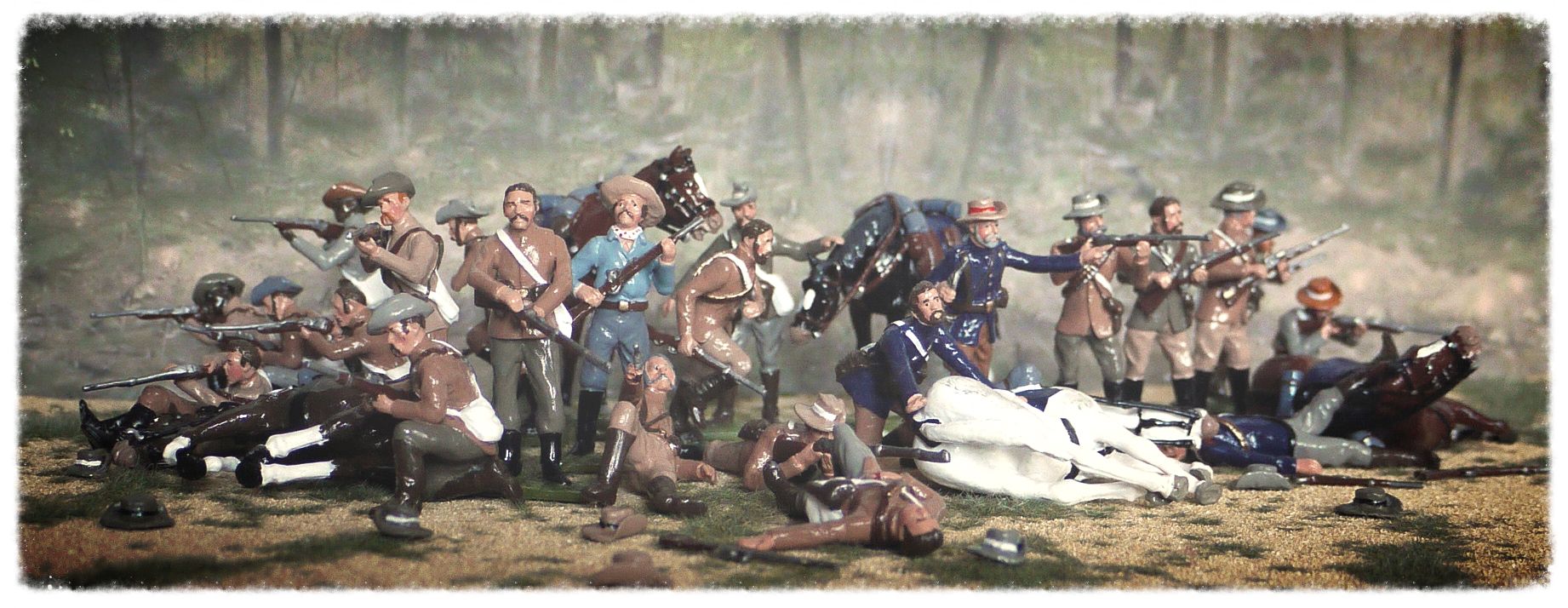
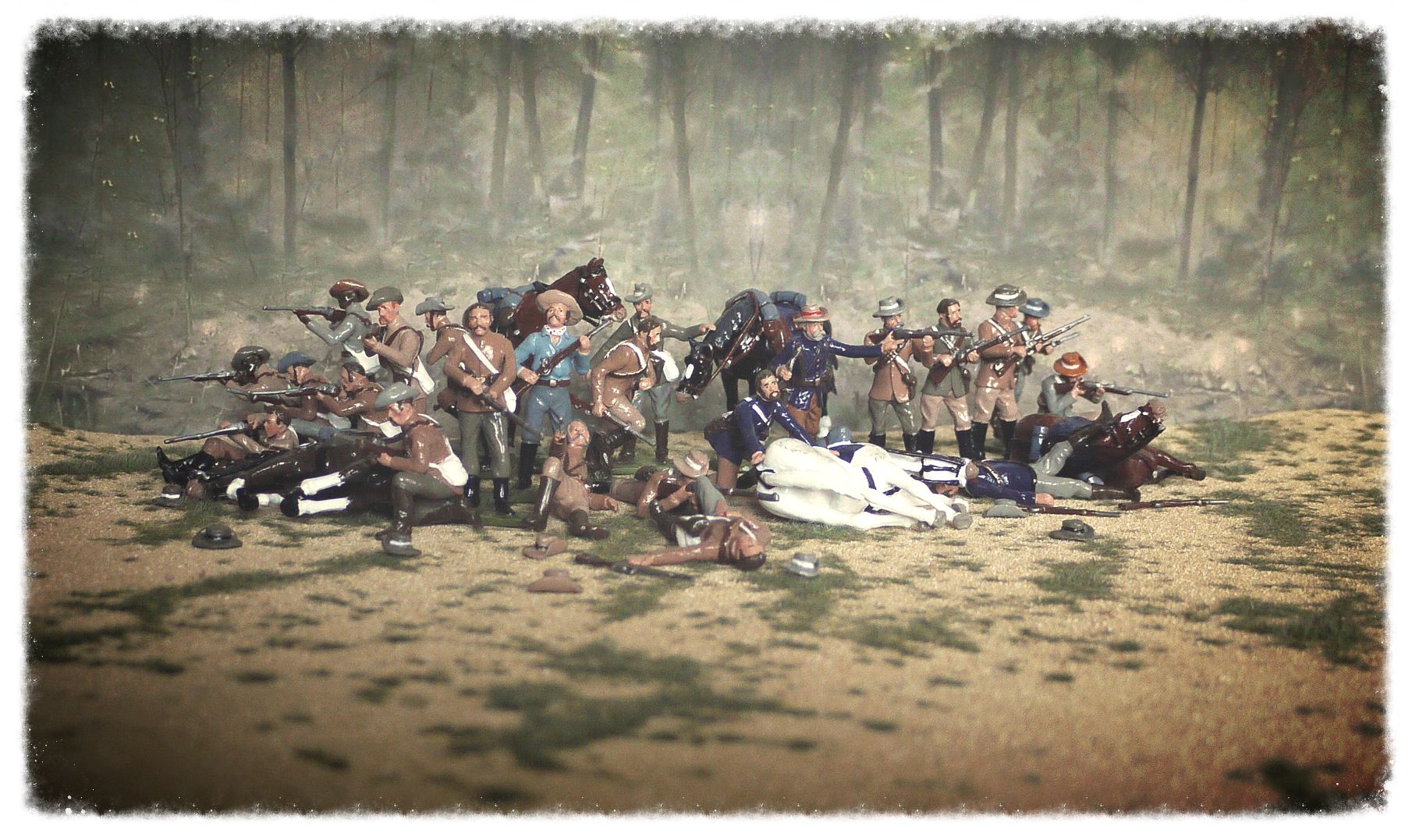
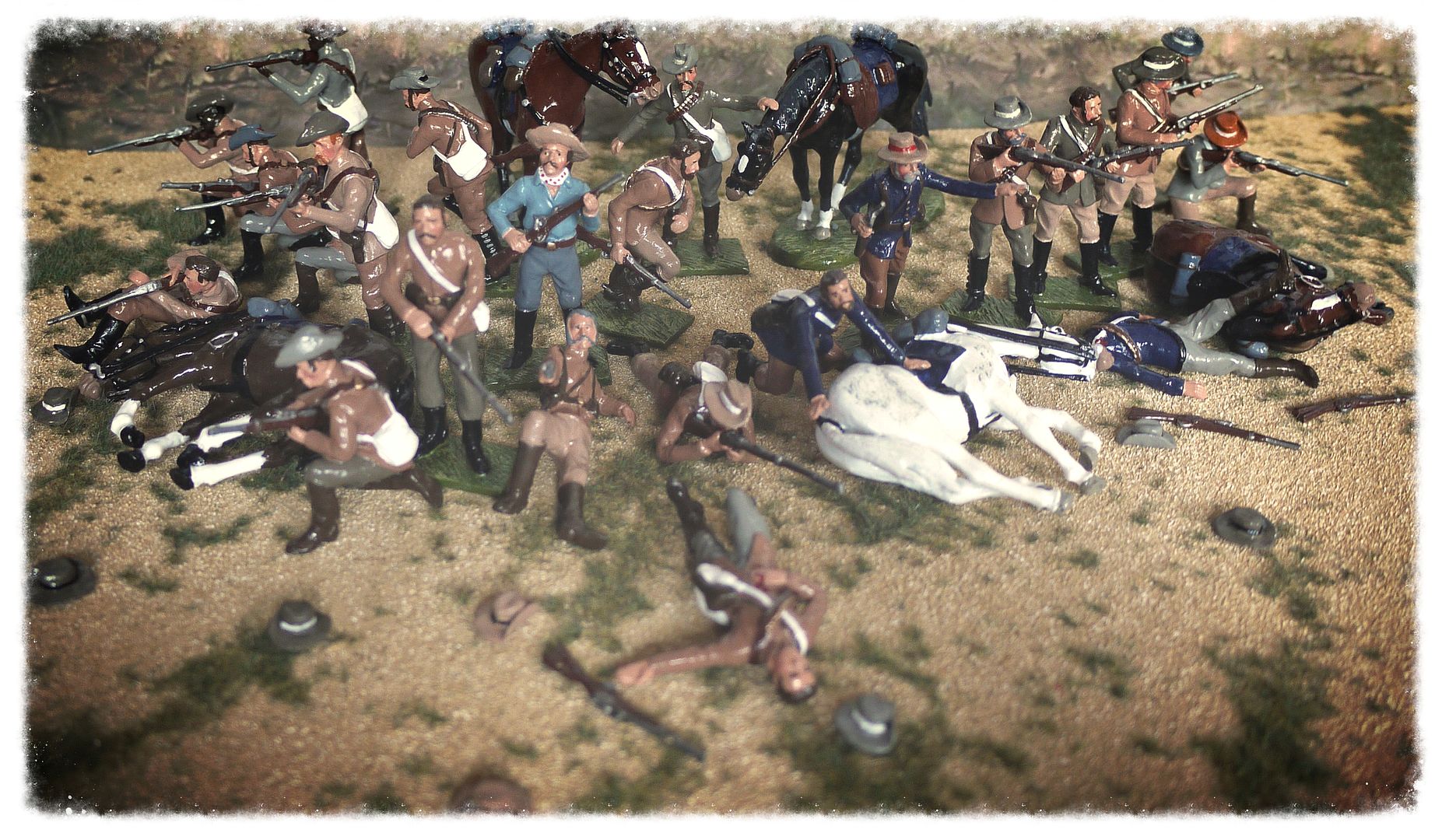
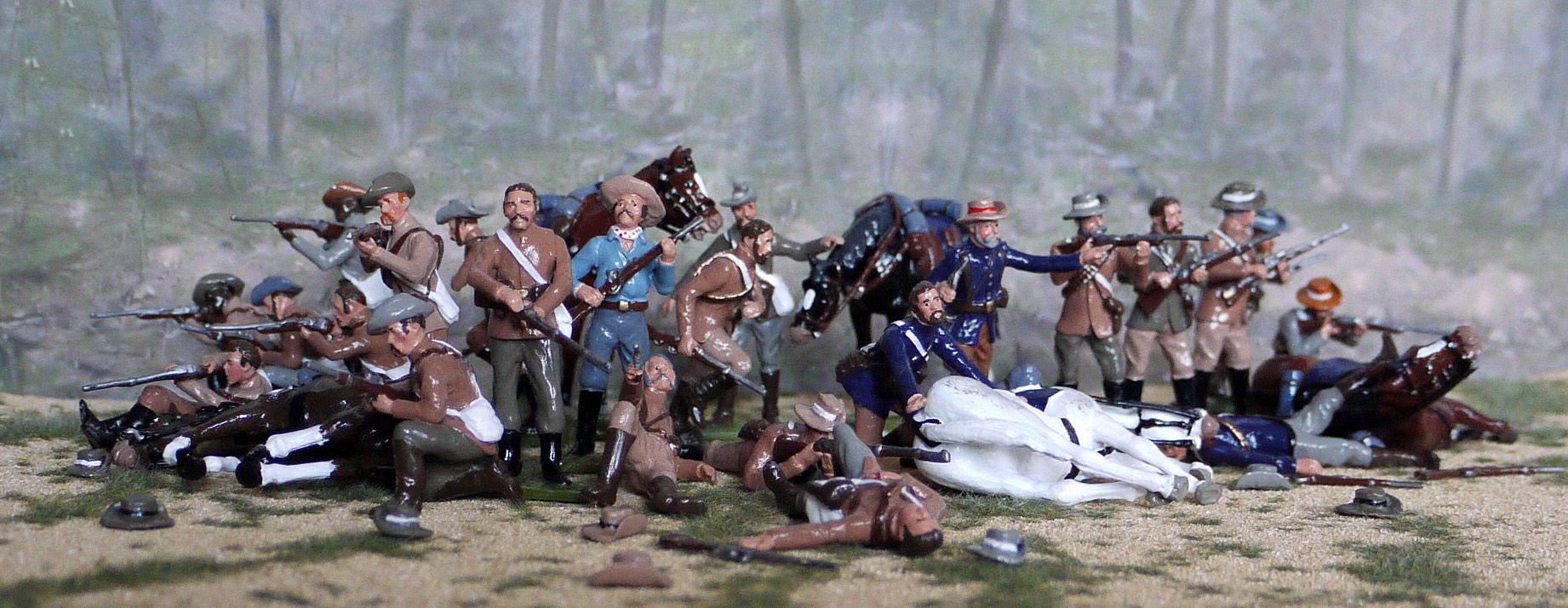
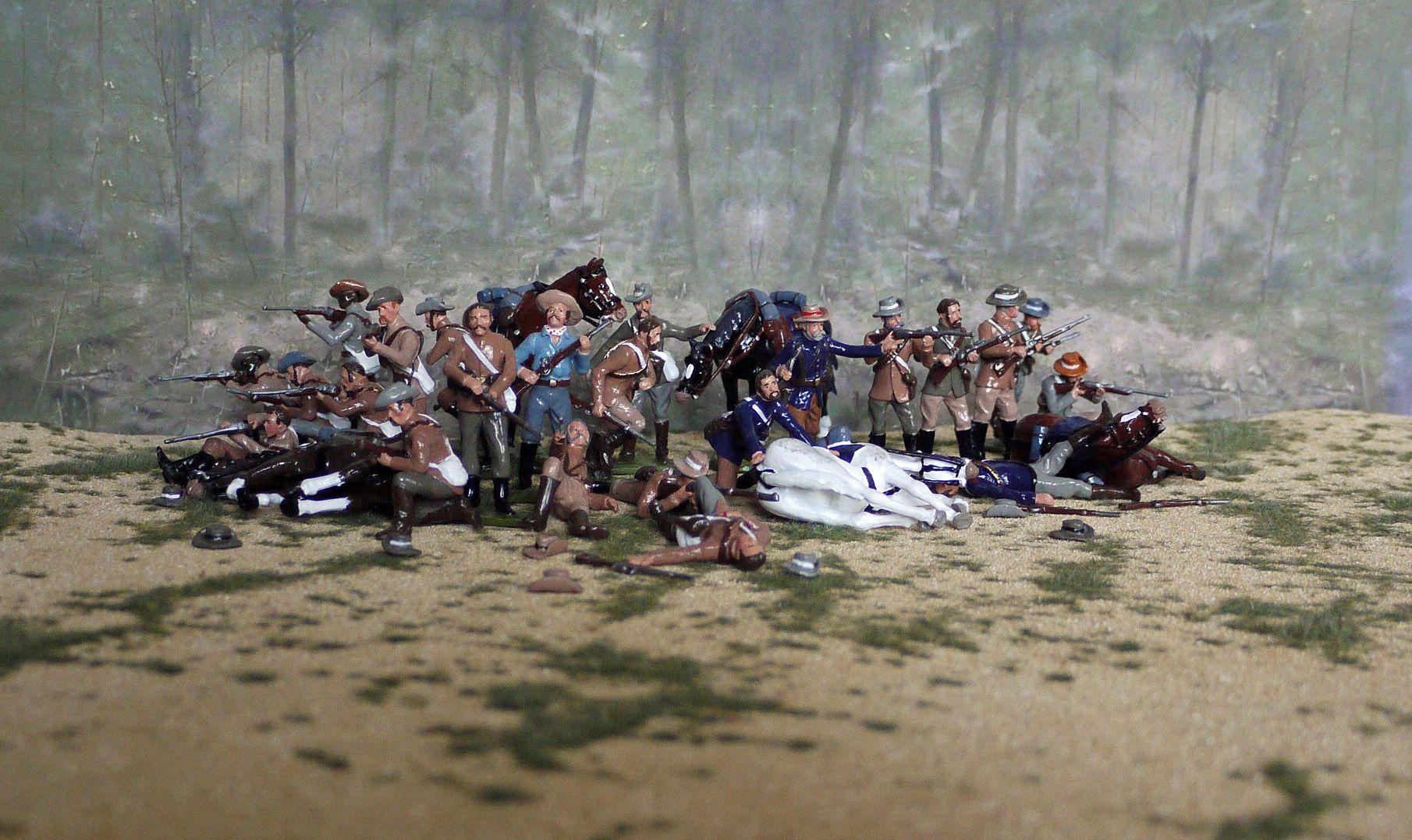
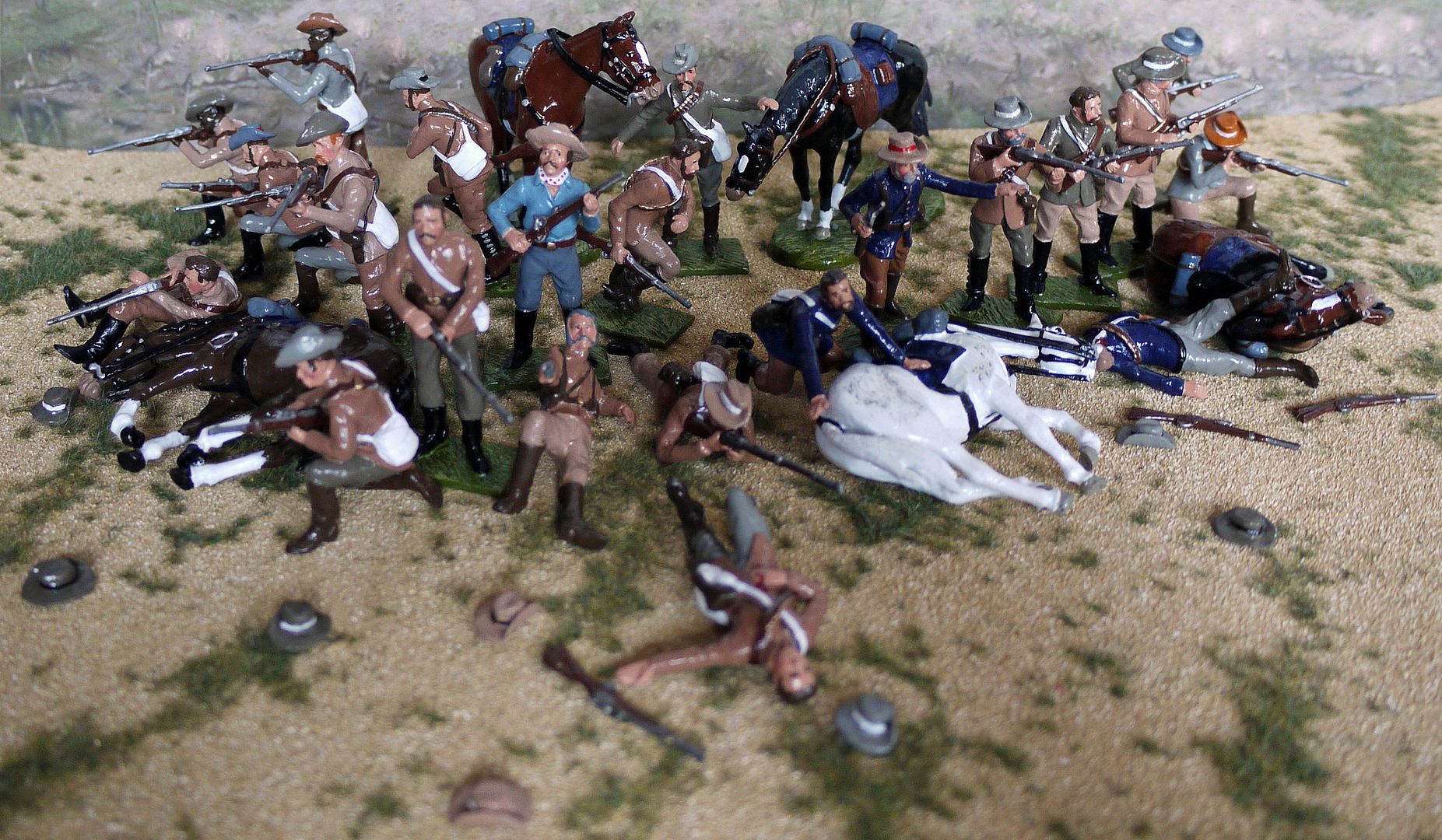
All figures - Little Legion
Cheers
Martyn

The Shangani Patrol, comprising 34 soldiers in the service of the British South Africa Company, was ambushed and annihilated by more than 3,000 Matabele warriors during the First Matabele War in 1893. Headed by Major Allan Wilson, the patrol, also referred to as Wilson's Patrol, was attacked just north of the Shangani River in Matabeleland in Rhodesia. Its dramatic last stand, sometimes called Wilson's Last Stand, achieved a prominent place in the British public imagination and, subsequently, in Rhodesian national history, roughly mirroring events such as the Alamo massacre or Custer's Last Stand in the United States.
The subsequent fate of the Wilson patrol, whose bones now rest beneath their memorial on the Matopo hill on which Cecil Rhodes lies buried, was gathered afterwards from Matabele sources. They had selected a clearing among the trees for their last stand and, some standing, some kneeling, poured a hot fire in all directions. The Matabele had the advantage of better cover and took time to aim accurately and make their shots tell. But so calmly and steadily did the patrol fight back that in spite of the bush and the trees they took a heavy toll of the enemy.
At one stage in the fight the Matabele said they had offered the white men their lives provided they laid down their arms and surrendered. Their offer was scornfully rejected. There would be no surrender.
An attempt to break through would mean sacrificing the wounded. That was unthinkable. They would face it together.
The patrol used their dead horses as cover, but their number steadily dwindled. Many were killed outright, and the wounded went on fighting until they lost consciousness. The fight went on until late in the afternoon. Just before the end the few surviving white men staggered to their feet, sang a few bars of "God Save the Queen", shook hands with each other, and waited for the end. It was not long in coming. The Matabele charged them with their assegais, and gave no quarter. One last man escaped for a few precious minutes, gained the top of an anthill a few yards away and shot down several Matabele before a bullet smashed his hip. He was still firing a revolver as the assegais ended his life.
There were no survivors
The men of the patrol came from all corners of the British Empire and beyond, most were born in Britain itself, over a dozen were English Public School and University men, Allan Wilson himself was originally Scottish, while Captain Henry Borrow was born in Cornwall. Also represented in the patrol were South Africa (several members, most prominently Captain William Judd), India (Troopers Dillon and Money), Canada (Scout Robert Bain), and New Zealand (Trooper Frank Vogel).






All figures - Little Legion
Cheers
Martyn
W T Allison II
Command Sergeant Major
- Joined
- Dec 6, 2009
- Messages
- 2,263
Martyn: Very well done. Also really liked your Post Office Rifles hand to hand sets. Thanks for posting. TommyDecember 4th 1893 -THE LAST STAND OF THE SHANGANI PATROL

The Shangani Patrol, comprising 34 soldiers in the service of the British South Africa Company, was ambushed and annihilated by more than 3,000 Matabele warriors during the First Matabele War in 1893. Headed by Major Allan Wilson, the patrol, also referred to as Wilson's Patrol, was attacked just north of the Shangani River in Matabeleland in Rhodesia. Its dramatic last stand, sometimes called Wilson's Last Stand, achieved a prominent place in the British public imagination and, subsequently, in Rhodesian national history, roughly mirroring events such as the Alamo massacre or Custer's Last Stand in the United States.
The subsequent fate of the Wilson patrol, whose bones now rest beneath their memorial on the Matopo hill on which Cecil Rhodes lies buried, was gathered afterwards from Matabele sources. They had selected a clearing among the trees for their last stand and, some standing, some kneeling, poured a hot fire in all directions. The Matabele had the advantage of better cover and took time to aim accurately and make their shots tell. But so calmly and steadily did the patrol fight back that in spite of the bush and the trees they took a heavy toll of the enemy.
At one stage in the fight the Matabele said they had offered the white men their lives provided they laid down their arms and surrendered. Their offer was scornfully rejected. There would be no surrender.
An attempt to break through would mean sacrificing the wounded. That was unthinkable. They would face it together.
The patrol used their dead horses as cover, but their number steadily dwindled. Many were killed outright, and the wounded went on fighting until they lost consciousness. The fight went on until late in the afternoon. Just before the end the few surviving white men staggered to their feet, sang a few bars of "God Save the Queen", shook hands with each other, and waited for the end. It was not long in coming. The Matabele charged them with their assegais, and gave no quarter. One last man escaped for a few precious minutes, gained the top of an anthill a few yards away and shot down several Matabele before a bullet smashed his hip. He was still firing a revolver as the assegais ended his life.
There were no survivors
The men of the patrol came from all corners of the British Empire and beyond, most were born in Britain itself, over a dozen were English Public School and University men, Allan Wilson himself was originally Scottish, while Captain Henry Borrow was born in Cornwall. Also represented in the patrol were South Africa (several members, most prominently Captain William Judd), India (Troopers Dillon and Money), Canada (Scout Robert Bain), and New Zealand (Trooper Frank Vogel).






All figures - Little Legion
Cheers
Martyn
GICOP
Four Star General
- Joined
- Oct 16, 2008
- Messages
- 28,316
Martyn: Very well done. Also really liked your Post Office Rifles hand to hand sets. Thanks for posting. Tommy
Many thanks Tommy :salute::
Cheers
Martyn
Arnhemjim
Corporal
- Joined
- Aug 28, 2009
- Messages
- 404
Today the seventh of December ...
On another Sunday morning 73 years ago, the endless drone of aero engines could be heard approaching from the North a great harbour and a sleeping fleet ....
Bests
OD
7 December 1941. Having researched the planning for the attack, thought that members of the forum might be interested in the following perspective which a majority are probably not aware of; http://arnhemjim.blogspot.com/p/military-strategy.html.
Arnhem Jim
Arizona Territory
GICOP
Four Star General
- Joined
- Oct 16, 2008
- Messages
- 28,316
The Battle of Abu Klea - 17th January 1885
http://en.wikipedia.org/wiki/Battle_of_Abu_Klea
Camel Corps in action
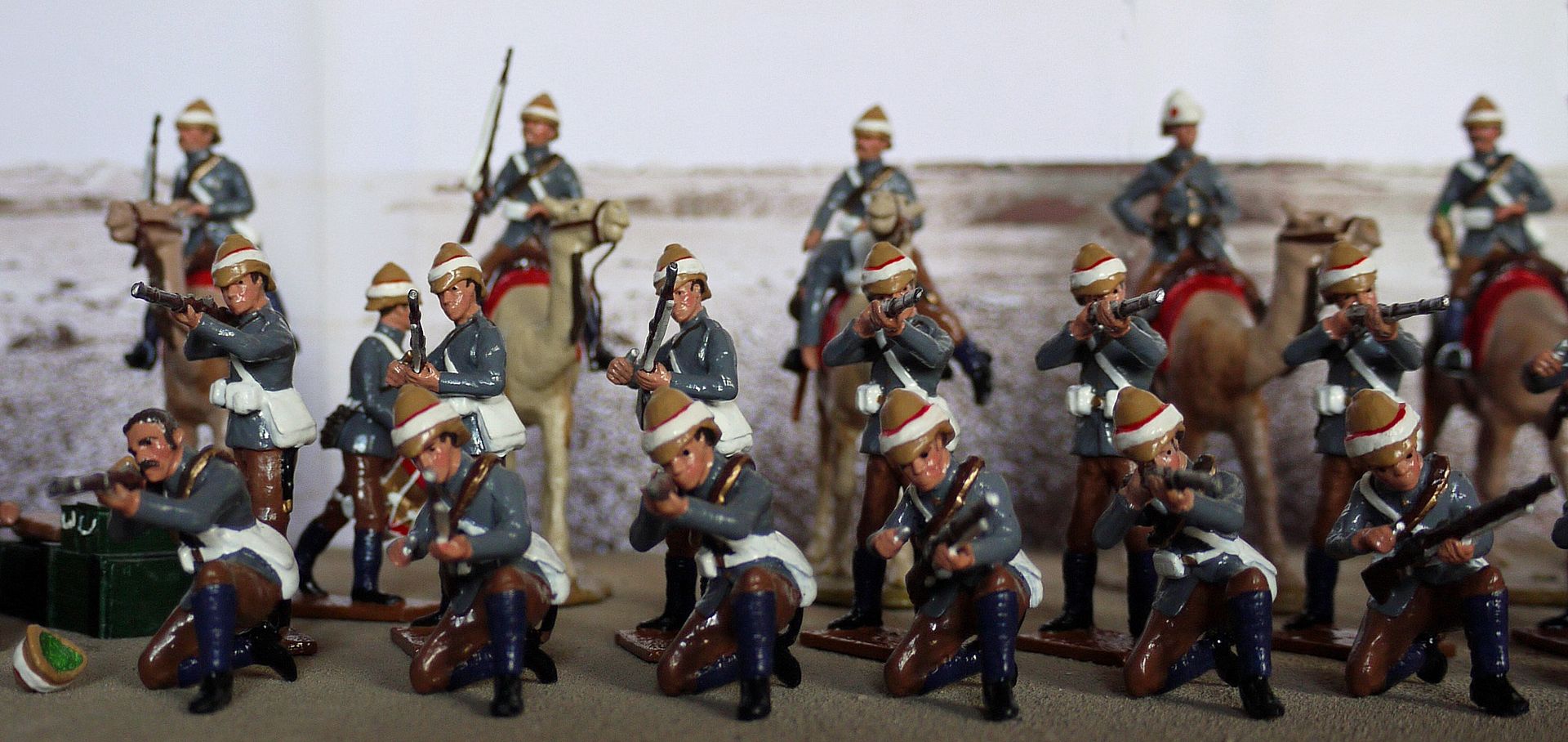
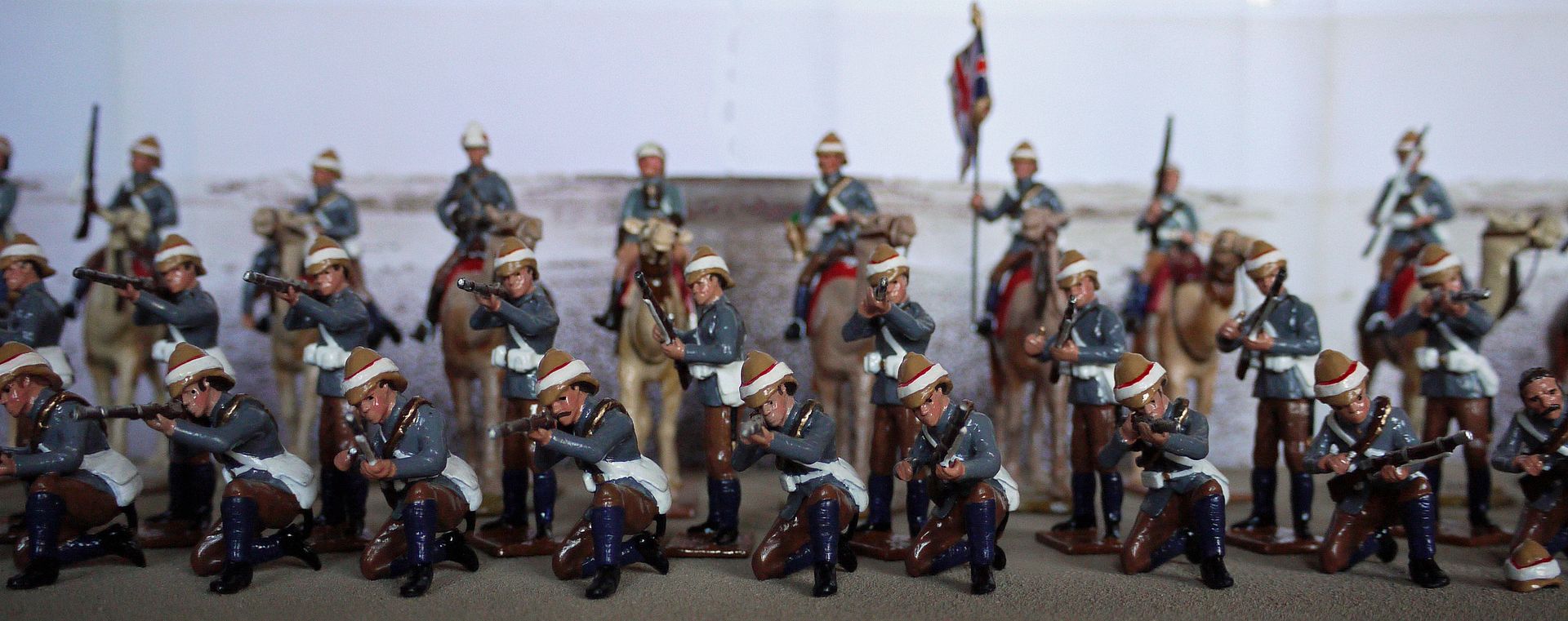
All figures - Little Legion
Cheers
Martyn
http://en.wikipedia.org/wiki/Battle_of_Abu_Klea
Camel Corps in action


All figures - Little Legion
Cheers
Martyn
GICOP
Four Star General
- Joined
- Oct 16, 2008
- Messages
- 28,316
Today, January 22nd, is the 136th anniversary of the Battle of Isandlwana
http://en.wikipedia.org/wiki/Battle_of_Isandlwana
Breakfast at the camp

The Zulu attack and the camp is overrun very quickly

It is soon all over, “The Spears are Washed”
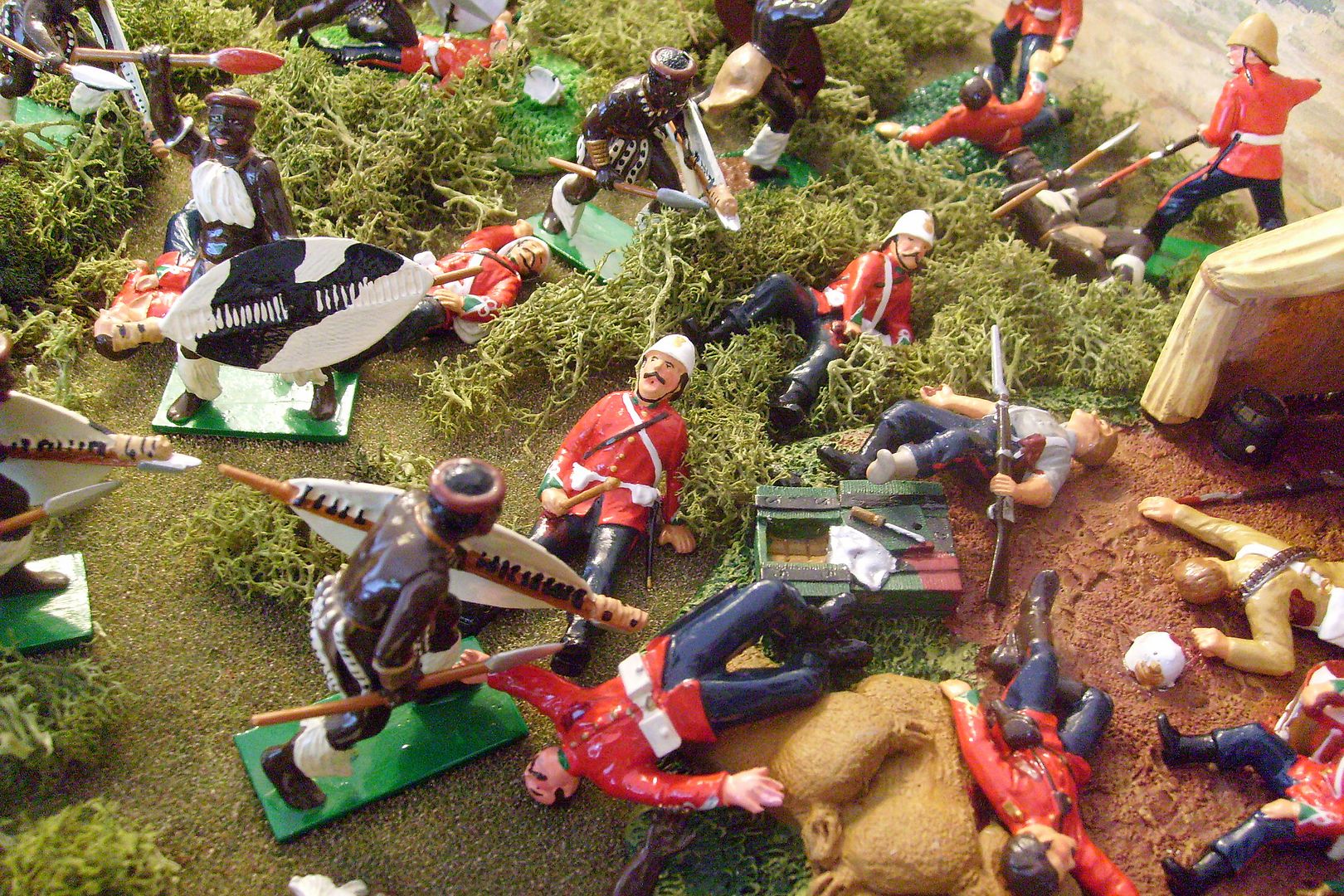
All figures - Trophy of Wales
http://en.wikipedia.org/wiki/Battle_of_Isandlwana
Breakfast at the camp

The Zulu attack and the camp is overrun very quickly

It is soon all over, “The Spears are Washed”

All figures - Trophy of Wales
GICOP
Four Star General
- Joined
- Oct 16, 2008
- Messages
- 28,316
ANGLO ZULU WAR
Battle of Ulundi July 4th 1879
The Charge of the 17th Lancers
http://www.britishbattles.com/zulu-war/ulundi.htm
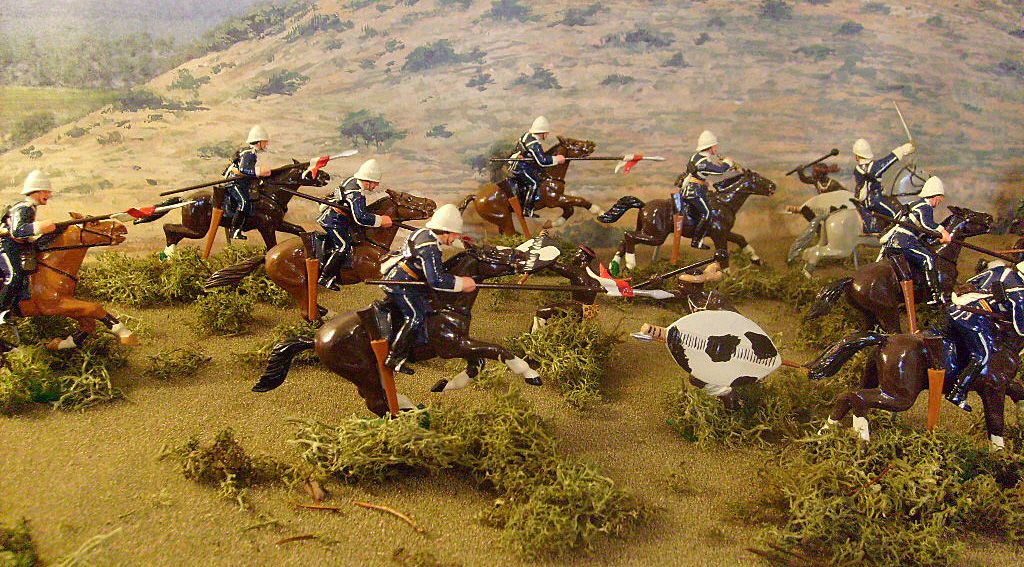
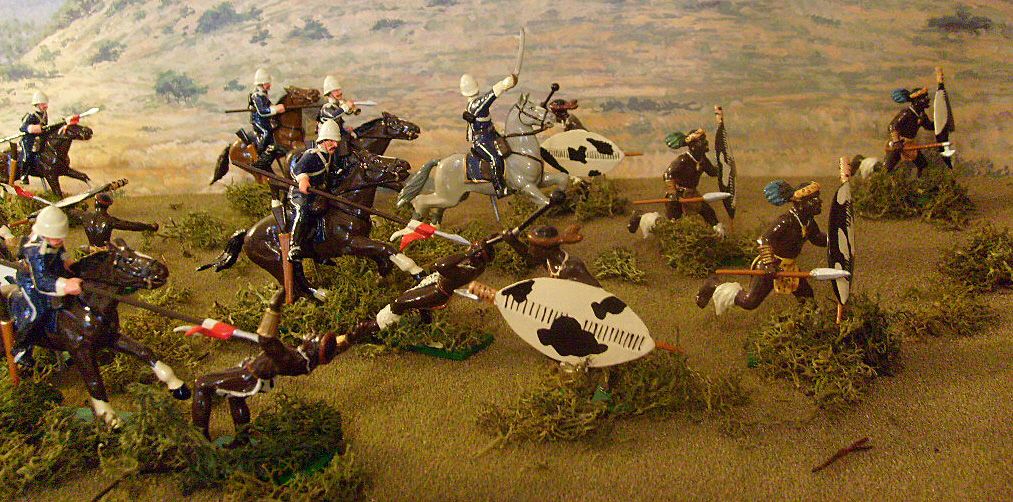
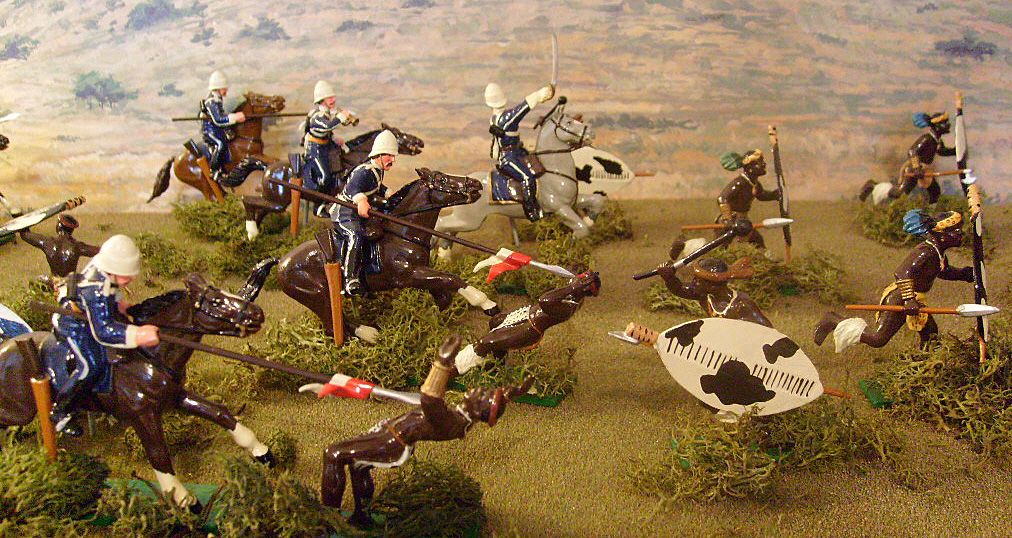
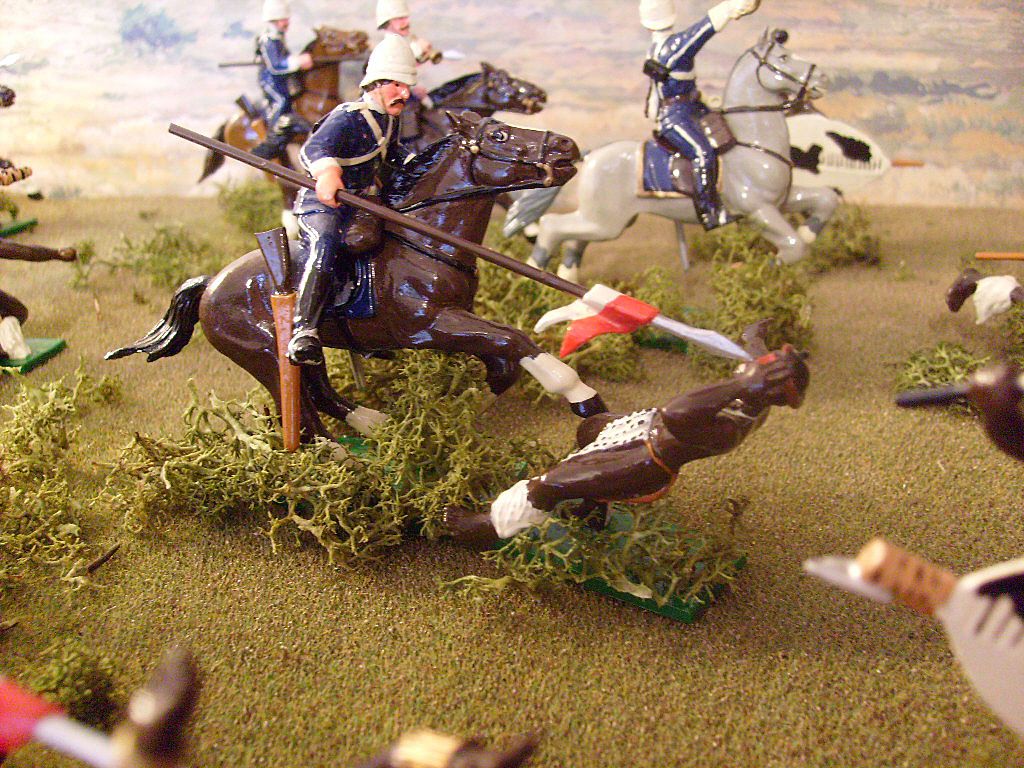
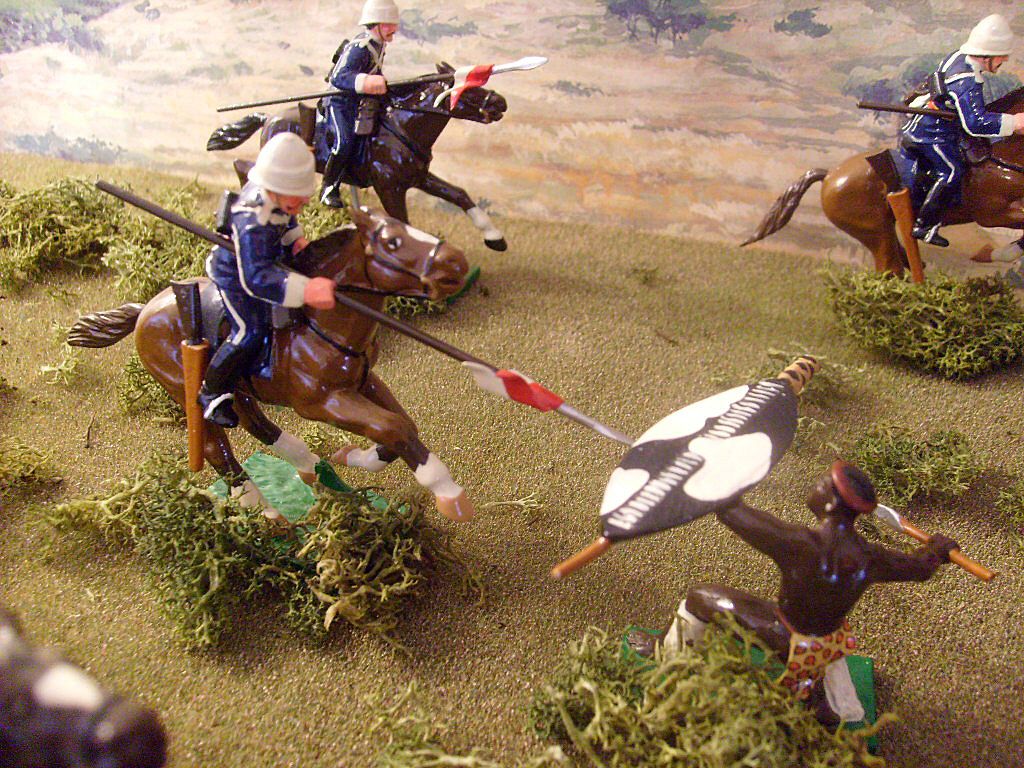
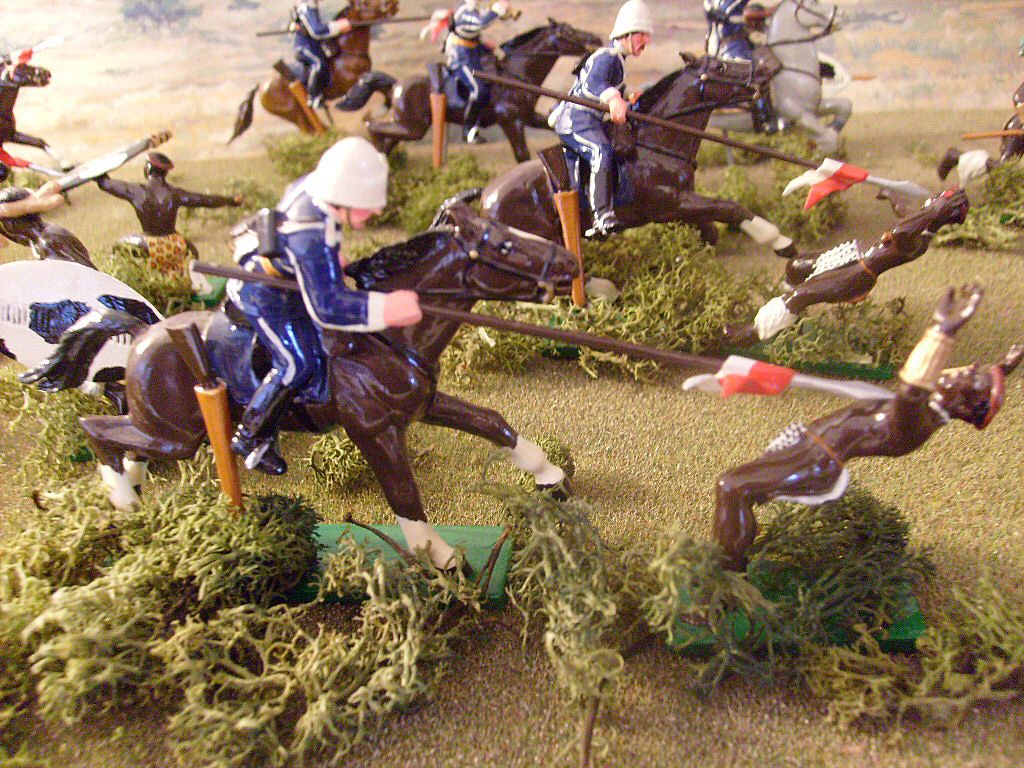
Ably assisted by the 1st Kings Dragoon Guards
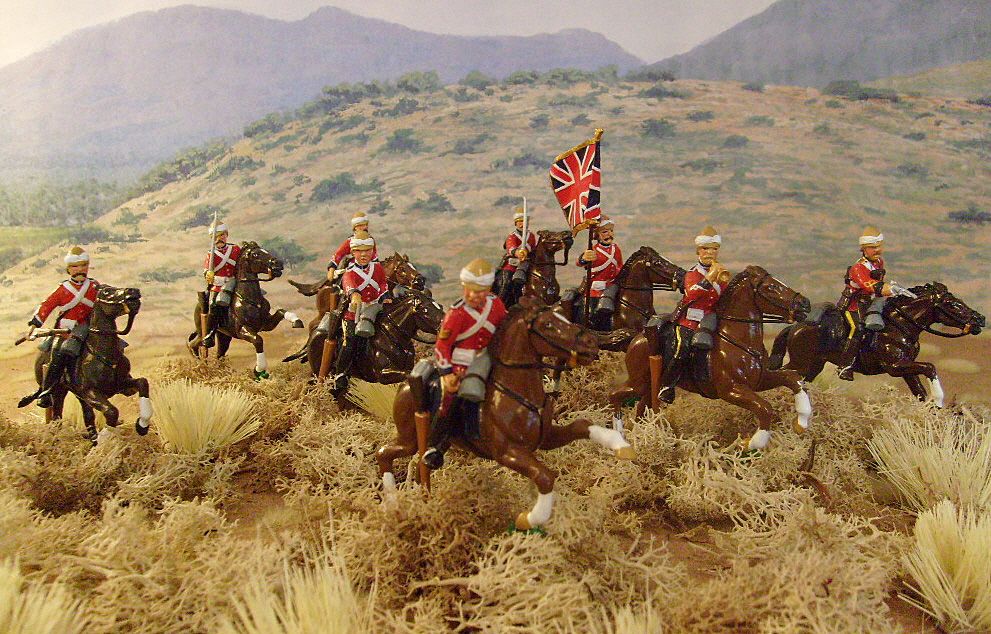
All figures - Trophy of Wales
Cheers
Martyn
Battle of Ulundi July 4th 1879
The Charge of the 17th Lancers
http://www.britishbattles.com/zulu-war/ulundi.htm






Ably assisted by the 1st Kings Dragoon Guards

All figures - Trophy of Wales
Cheers
Martyn
Buster
Command Sergeant Major
- Joined
- Dec 4, 2011
- Messages
- 2,806
On August 9, 1942 Gandhi and all leaders of Congress were arrested in Bombay following numerous clashes between separatists and police. Gandhi, "the great soul", promoted against the British government's independence through the use of non-violence with the Quit India movement
Users who are viewing this thread
Total: 2 (members: 0, guests: 2)


